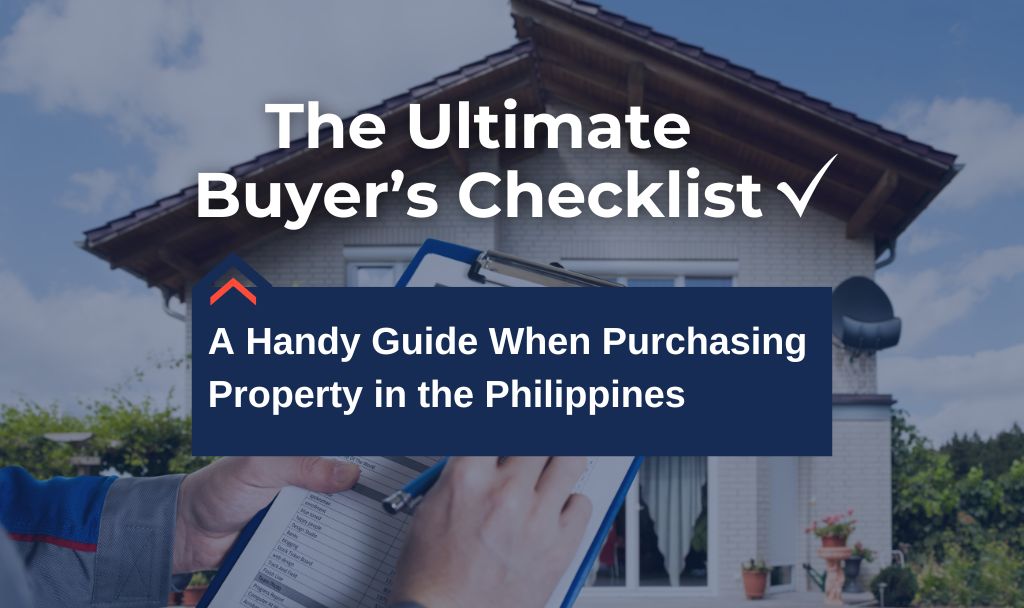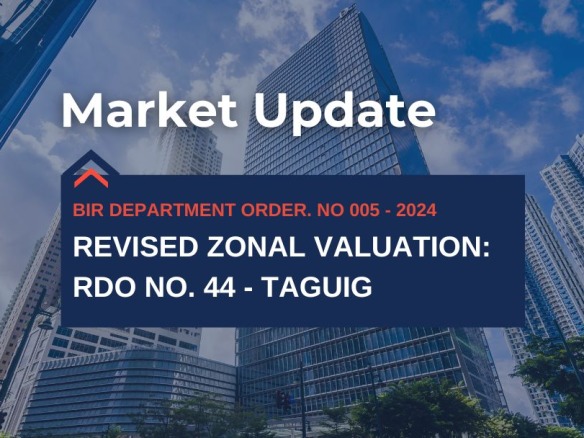Are you planning to buy a property here in the Philippines? Congratulations on deciding to take the next step! But before you do, make sure you go through this property buyers checklist so property buyers like you will be equipped with the right knowledge to confidently go about this process. Careful planning and a thorough understanding of the real estate landscape make it easier to figure out the next steps for a hassle-free experience.
The Ultimate Property Buyers Checklist
Part 1: Self-reflection

-
1.1 Find Out Your Reasons For Wanting to Purchase.
Are you planning to live on the property, or is it more of an investment for yourself and your family? Perhaps you’re considering renting it out. Think about this carefully because this can influence your choices later on. It can also affect how much budget you’ll put into the purchase.
-
1.2 Consider How Well You’ll Be Able To Manage The Property.
When a property is managed well, it becomes a solid investment. Regardless if you choose to rent it out or live on it, taking care of your property saves you a lot of time, effort, and money later on.
Part 2: Financial Readiness

-
2.1 Know Your Budget.
Set a realistic budget. Do this before diving into property listings. Assess your financial capabilities, along with your current assets, liabilities, and financial goals. Take into account the following:
- Purchase Price: This is the asking price of the property.
- Down Payment: This is the amount you’re going to pay upfront. Typically, it ranges between 10% to 20% of the purchase price.
- Payment Term: Are you paying in cash or through bank financing? For cash payments, the remaining balance shall be paid in full within 30 days from your down payment. For bank financing, the remaining balance shall be paid by your bank to the seller via a Bank Guarantee document, which is also due in 30 days. Best to speak with your bank to get pre-approval on your loan prior to purchasing a property.
- Closing Costs: To transfer the property under your name as the new owner, expect to shoulder at least 3% from the total purchase price to cover for the following:
- Documentary Stamp Tax
- Registration Fees
- I.T. Fees
- Title Transfer Fees
- Notarization Fees
- Association Dues and Real Property Tax: This can be paid annually so you can take advantage of discount incentives offered by the village association (association dues) and the city government (real property tax).
- Renovation Costs: This is necessary if you’re planning to make improvements or changes to the home.
- Maintenance Costs: Think about potential repairs or replacements to make the property to suit your needs and preferences.
- Furniture, Appliances, and Other Home Expenses: This may be something you have to think of down the road if you’re not living on the property right away. However, it would be prudent to take this into account early on.
-
2.2 Obtain Pre-Approval. (Highly Recommended for a Bank Loan Purchase)
Show sellers and developers your readiness and financial capability by securing this. Doing so also demonstrates that you are serious about buying the property. At the same time, it eliminates other time-consuming steps in the process, which consequently strengthens your position when negotiating the terms of payment and other conditions.
-
2.3 Get your financial documents ready.
Avoid the hassle of compiling these documents when you’re already well on your way through the purchase process. Organize these documents beforehand.
- Bank Statements: These show your income and spending habits.
- Income Tax Returns: These provide veritable proof of income.
-
- Payslips For Employed Individuals: These indicate your salary.
- Audited Financial Statements For Business Owners: These demonstrate the financial health of your business.
- Proof of Assets: These illustrate your financial standing based on your property ownership and investments.
Do note that banks have different requirements so make sure to comply accordingly.
Part 3: Needs & Preferences

-
3.1 Determine What You Need.
Location:
- Where do you see yourself living? Or where do you think your investment will thrive? Is it the city, the suburbs, or the countryside?
- If you’re a young family, think about the proximity to various establishments such as schools, hospitals, and malls.
- Consider the neighborhood, too. What’s it like to live in this locale?
- Think about the accessibility. What are the options for transportation? How about the potential traffic congestion?
- Another thing to watch out for is flood risks and earthquakes (proximity to fault line)
Property Type:
- Lot: There are advantages to just buying a lot. You’ll be open to designing your abode according to your preferences. However, building from scratch can also take longer than moving into a ready-built home.
- House & Lot: If you prefer to move in right away, this could be the better option. You can save money and time on construction costs. But if you choose this, look into the number of rooms, bathrooms, garage space, and other features.
- Condo: This is another option if you want to move in right away unless it’s still preselling. The advantage of living in a condo is you generally have less upkeep to think about.
- Pre-selling, Brand New, or Resale: Do you want a brand-new, move-in ready property, or are you open to buying one for resale? Note that while it’s not always the case, new properties tend to come at a higher price. For pre-selling projects, while they seem more expensive on a per/sqm basis, the payment terms that the developers offer are much more flexible.
-
3.2 Consider Your Lifestyle.
Do you constantly travel? Perhaps you want to find your forever home so you and your family can finally settle in. What are your hobbies, or what hobbies do you want to develop? Will there be opportunities for you to hone them in this neighborhood?
-
3.3 Think About Other Considerations.
- Security: What type of security are they providing in your chosen neighborhood? Is a gated community important to you?
- Amenities: What features does this community have? Does it have a gym, swimming pool, football field, basketball/tennis court, etc.?
- Future Developments: What are the projects in the pipeline? Look into the commercial establishments or infrastructures that developers are planning to build in the area. This can affect your living conditions and the property value.
- Association Dues: Inquire about these fees and other responsibilities as a future home/unit owner.
Part 4: Due Diligence

- 4.1 Engage a Licensed Real Estate Broker. One of the best ways to make your property purchase hassle-free is to team up with a licensed real estate broker who understands the ins and outs of the property market. At Upside, we guide you throughout the process—from finding the right property and negotiating with sellers to helping you with paperwork and providing after-sales support.
- 4.3 Conduct A Thorough Property Inspection. You may have done the initial viewing and have fallen in love with the property. But you should also let professionals take a look. If you’re buying a house and lot, have a licensed engineer or contractor inspect the property for structural issues, water damage, electrical problems, and potential termite infestation.
Part 5: Understanding the Legalities and Securing the Property

-
5.1 Have a Lawyer Review Pertinent Documents.
These documents include the following:
Offer to Purchase: Prepared by your Real Estate Broker, this document is the first step in acquiring a property. It outlines the terms of the sale. Once accepted by the Seller, the payment schedule and paperwork shall commence.
Due Diligence Documents: Part of doing your due diligence is to inspect the legality of the documents. Hire a lawyer to look over this to ensure it’s free from liens or encumbrances, and that the names of the owners as per title match the name of the seller indicated in the Contract to Sell and Deed of Absolute Sale.
- Certified True Copy of the Transfer Certificate of Title
- Certified True Copy of the Tax Declaration
- Latest Tax Clearance
- Certificate of Management that associated dues are paid + Official Receipt of paid association dues
- Valid Government IDs of the owners as per Title
- Tax Identification Number (TIN) of Seller
Contract to Sell: This legally binding document outlines the terms of the sale, including the purchase price, payment schedule, and closing date. It also states special conditions like securing financing or completion of repairs before the sale is finalized and termination clauses. This document is signed simultaneously with the handover of the down payment or earnest money.
Deed of Absolute Sale: This represents the final transfer of ownership. Upon signing the Deed of Absolute Sale, the buyer becomes the legal owner of the property. The TCT will be transferred to the buyer’s name. This document is signed simultaneously with the handover of the full payment to the Seller.
Tax Implications: There are taxes that you have to pay when purchasing a property in the Philippines as mandated by the government. These are:
- Documentary Stamp Tax
- Registration Fees
-
-
- I.T. Fees
- Notarial Fees
- Title Transfer Fees (via a third-party Title Transfer company)
-
Registration and Permits: Check if there are clearances or permits that you need from the local government or homeowners association. Depending on the property, these could be:
-
- Barangay Clearance to certify no outstanding obligations or community disputes
- Tax Clearance to verify payment of property taxes
- Certificate of Management issued by HOA to ensure there are no outstanding HOA fees
That’s it for this Ultimate Property Buyers Checklist! Want to learn more about real estate? Check out our other blog posts here or contact us at +63 917 850 2034 to know more.






Join The Discussion